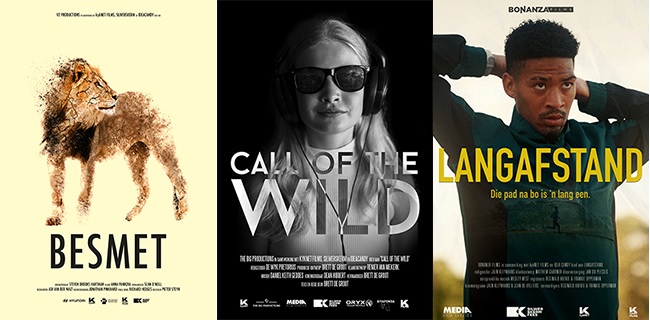
- This year's Silwerskerm Film Festival was the first time the event had a special slot for documentaries.
- The festival ran from 23 to 25 August.
- Six short documentaries debuted at the event.
For the first time, the Silwerskerm Film Festival gave a special slot for short documentaries. The six short documentaries covered a range of topics, with some focusing on specific individuals and others exploring a particular topic.
Here's what we thought of the documentaries:
'n Gids Vir Louzanne
'n Gids Vir Louzanne, directed by Eddie Stanley and produced by Charlene Stanley, focuses on Louzanne Coetzee, a visually impaired athletic runner from Bloemfontein. The short paints an honest and empathetic portrait of Coetzee, by using her own words and those of her running guides. Throughout her running career, Coetzee has had several guides, who each have had an impact on her life and career. The film gives equal weight to her successes and failures and explores parts of her personal life, like her leadership role at a women's hostel.
The documentary is inspirational and avoids being over-sentimental. Coetzee provides an engrossing subject, sharing anecdotes and insights into her sports career. The guides in the documentary are also given proper attention and the film thoroughly explores the tight bond between runner and guide. It also delivers a beautiful message about the importance of strong support and trust to overcome adversity.
Besmet
Besmet, directed by Pieter Steyn and produced by Sean O'Neill, is a short wilderness documentary that focuses on lion poaching in the Kruger National Park. What makes this such a strong and compelling film is its laser focus on a specific issue. Steyn has fully utilised the documentary format for maximum impact.
The film shows the aftermath of poachers using poison to kill lions and then mutilate their bodies. Lions are sometimes mutilated for traditional reasons, the animal being an important status symbol in certain communities.
The film explicitly shows the mutilated bodies of the lions, which will be disturbing for some viewers, but those visuals effectively sketch the severity of the issue. The documentary communicates the scale of the problem in a way words can not. The interviews featured are shocking and insightful, coming from a diversity of backgrounds - including several park rangers, conservationists and even a traditional healer.
The film emphasises education as a means to combat the issue. Communities where there is a demand for lion parts need to be educated about harmful practices that could contribute to the species' endangerment.
Langafstand
Langafstand is an intimate portrait of a young long-distance runner from Cloetesville, part of the Stellenbosch area. Directed and produced by Reginald Hufkie and Frankie Opperman, the film documents a few days in the life of Deon-Lee Hendricks. He prepares for a running competition that could be an important stepping stone for his career; those who do well will be selected to compete in the World Athletics competition held in Australia.
The camera follows Hendricks as he trains, walks through his community, talks to his neighbours, gives a tour of his room etc. There are also interviews with his father, trainer and sister. The film is not really a success story, but instead its about determination and rising above one's circumstances. One of Hendricks's driving forces is his late mother, whose memory he uses to push him forward. Hendricks may only be an up-and-coming runner, but his passion makes him an interesting subject for a documentary.
The cinematography and editing, headed by Jaen Kleynhans, is air tight. Almost every shot is beautifully composed, while feeling completely organic. The documentary also shows a side of Stellenbosch that is rarely given attention. The community spirit of Cloetesville really comes through in the film.
Teater Na Die Mense
Teater Na Die Mense delves into a rarely explored part of South African arts: the impact of the Cape Flats Players. The documentary, written, directed and produced by Nadine Cloete, gives voice to the members of the Cape Flats Players; they share their history and reflect on their role in SA arts.
The group arose from DRAMSOC, which was closely tied to influential poet and playwright Adam Small. Throughout the documentary, Small's legacy is discussed and his plays are performed. The film shows how theatre became an important form of protest and resistance during apartheid, both in its content and their very performance.
What really makes the documentary work is having work its interview subjects just talk and pour out their passion for theatre. The doc uncovers an oral history not yet committed to film, making it a valuable resource to learn more about the Cape Flats Players.
Teater Na Die Mense is a documentary that will reward repeated viewings, because it offers so much insight and knowledge.
Call Of The Wild
Call Of The Wild isn't just a documentary, its a unique audio-visual experience. From the filmmaker Brett de Groot, Call Of The Wild focuses on Anika, a girl with a visual impairment and a interest in wildlife (especially birds). In the documentary, Anika is given the opportunity experience a safari expedition with special audio technology that amplifies the smallest noises. The sound safari offers a novel and more immersive way to experience wild life and increases accessibility for visually impaired people.
Call Of The Wild is beautifully shot and every frame looks like a perfectly composed photograph. Sound is an essential element in the documentary, and it is treated with extreme care. This is a highly artistic documentary, which has an abstract quality to it reminiscent of a Terrence Malick film. Despite its calculated technical execution, the documentary still feels like a candid slice of Anika's life. The audience is put into her world and experience it in a similar way she does.
Born Behind Bars
Born Behind Bars is a shocking exploration of the difficult circumstances pregnant women and their children endure in prison. The film, directed by Romy Titus and produced by Busisiwe Dube, features several disheartening testimonials from women who have had to give birth in prison and look after their children.
The documentary is a balanced portrayal of the issue, that emphasises the experiences of women prisoners with children, while acknowledging the work of prisons to accommodate them. Yet more can still be done; some of the interviews describe inhumane treatment by the prisons. At the heart of each testimonial, is a mother's turmoil that their child has to spend their early years in a prison and if they are taken away from them, they grow up without a mother.
Titus first came across the documentary as a junior journalist working for eNews in 2000. The documentary offers a new medium to learn about the issue, one that is more effective in unpacking the emotional and personal aspect of it. It's a fine piece of journalism, prioritising content over style.
READ MORE | Cartoonishly wacky to gleefully ridiculous: A roundup of Silwerskerm's short film showcase




 Publications
Publications
 Partners
Partners












